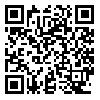Volume 4, Issue 3 (September 2017)
Health Spiritual Med Ethics 2017, 4(3): 48-57 |
Back to browse issues page
Download citation:
BibTeX | RIS | EndNote | Medlars | ProCite | Reference Manager | RefWorks
Send citation to:



BibTeX | RIS | EndNote | Medlars | ProCite | Reference Manager | RefWorks
Send citation to:
Heidari A, Vashian A. The Comparative Study of Patient’s Rights Charter and the Teachings of the Holy Quran and Ahlul-Bait (Peace Be Upon Them). Health Spiritual Med Ethics 2017; 4 (3) :48-57
URL: http://jhsme.muq.ac.ir/article-1-192-en.html
URL: http://jhsme.muq.ac.ir/article-1-192-en.html
1- Spiritual Health Research Center, Qom University of Medical Sciences, Qom, Iran
2- Spiritual Health Research Center, Qom University of Medical Sciences, Qom, Iran ,sadra251@gmail.com
2- Spiritual Health Research Center, Qom University of Medical Sciences, Qom, Iran ,
Abstract: (4726 Views)
Background and Objectives: Patient’s rights are one of the pivots to define the standard clinical care programs. Patient’s Rights Charter has been compiled and applied for defending human rights, protecting honor and dignity of patient, and ensuring that patients receive treatment without discrimination especially in case of medical emergencies. The aim of this study was to compare the contents of Patient’s Rights Charter with those of the Holy Quran and Ahadith.
Methods: To conduct this library, descriptive study, first, the principles of the Charter were drawn and then the Quran and relevant literature indexed in different databases were reviewed. Then, the points in question were written down, classified, and compared to those of the Charter.
Results: In general, the principles of the Charter represented in nine terms which were consistent with several verses of the Quran and Ahadith. These terms consisted of human dignity, justice and avoidance of injustice, beneficence, knowledge value, moral virtue, privacy and confidentiality, ownership, authority, and life-saving and life-sustaining.
Conclusion: All of the concepts of Patient’s Rights Charter can generally conform to the verses of Holy Quran and Ahadith. Since religious beliefs can play effective role in performance of health care professionals regarding patient's rights, it is recommended to apply the Quranic proofs of the Patient’s Rights Charter, which are in line with the Charter, for better performance.
Methods: To conduct this library, descriptive study, first, the principles of the Charter were drawn and then the Quran and relevant literature indexed in different databases were reviewed. Then, the points in question were written down, classified, and compared to those of the Charter.
Results: In general, the principles of the Charter represented in nine terms which were consistent with several verses of the Quran and Ahadith. These terms consisted of human dignity, justice and avoidance of injustice, beneficence, knowledge value, moral virtue, privacy and confidentiality, ownership, authority, and life-saving and life-sustaining.
Conclusion: All of the concepts of Patient’s Rights Charter can generally conform to the verses of Holy Quran and Ahadith. Since religious beliefs can play effective role in performance of health care professionals regarding patient's rights, it is recommended to apply the Quranic proofs of the Patient’s Rights Charter, which are in line with the Charter, for better performance.
Type of Study: Review Article |
Subject:
General
Received: 2017/08/7 | Accepted: 2017/08/7 | Published: 2017/08/7
Received: 2017/08/7 | Accepted: 2017/08/7 | Published: 2017/08/7
Send email to the article author
| Rights and permissions | |
 |
This work is licensed under a Creative Commons Attribution-NonCommercial 4.0 International License. |







